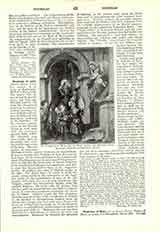

Nicholas of Lyra (Doctor planus et utilis), exegete, b. at Lyra in Normandy, 1270; d. at Paris, 1340. The report that he was of Jewish descent dates only from the fifteenth century. He took the Franciscan habit at Verneuil, studied theology, received the doctor’s degree in Paris and was appointed professor at the Sorbonne. In the famous controversy on the Beatific Vision he took sides with the professors against John XXII. He labored very successfully, both in preaching and writing, for the conversion of the Jews. He is the author of numerous theological works, some of which are yet unpublished. It was to exegesis that Nicholas of Lyra devoted his best years. In the second prologue to his monumental work,”Postillae perpetuae in universam S. Scripturam”, after stating that the literal sense of Sacred Scripture is the foundation of all mystical expositions, and that it alone has demonstrative force, as St. Augustine teaches, he deplores the state of Biblical studies in his time. The literal sense, he avers, is much obscured, owing partly to the carelessness of the copyists, partly to the unskillfulness of some of the correctors, and partly also to our own translation (the Vulgate), which not infrequently departs from the original Hebrew. He holds with St. Jerome that the text must be corrected from the Hebrew codices, except of course the prophecies concerning the Divinity of Christ. Another reason for this obscurity, Nicholas goes on to say, is the attachment of scholars to the method of interpretation handed down by others who, though they have said many things well, have yet touched but sparingly on the literal sense, and have so multiplied the mystical senses as nearly to intercept and choke it. Moreover, the text has been distorted by a multiplicity of arbitrary divisions and concordances. Hereupon he declares his intention of insisting, in the present work, upon the literal sense and of interspersing only a few mystical interpretations. Nicholas utilized all available sources, fully mastered the Hebrew and drew copiously from the valuable commentaries of the Jewish exegetes, especially of the celebrated Talmudist Rashi. The “Pugio Fidei” of Raymond Martini and the commentaries of St. Thomas Aquinas were laid under contribution. His exposition is lucid and concise; his observations are judicious and sound, and always original. The “Postillae” soon became the favorite manual of exegesis. It was the first Biblical commentary printed. The solid learning of Nicholas commanded the respect of both Jews and Christians.
Luther owes much to Nicholas of Lyra, but how widely the principles of Nicholas differed essentially from Luther’s views is best seen from Nicholas’s own words: “I protest that I do not intend to assert or determine anything that has not been manifestly determined by Sacred Scripture or by the authority of the Church . Wherefore I submit all I have said or shall say to the correction of Holy Mother Church and of all learned men …” (Prol. secund. in Postillas., ed. 1498). Nicholas taught no new doctrine. The early Fathers and the great schoolmen had repeatedly laid down the same sound exegetical principles, but, owing to adverse tendencies of the times, their efforts had partly failed. Nicholas carried out these principles effectively, and in this lies his chief merit—one which ranks him among the foremost exegetes of all times.
THOMAS PLASSMANN

